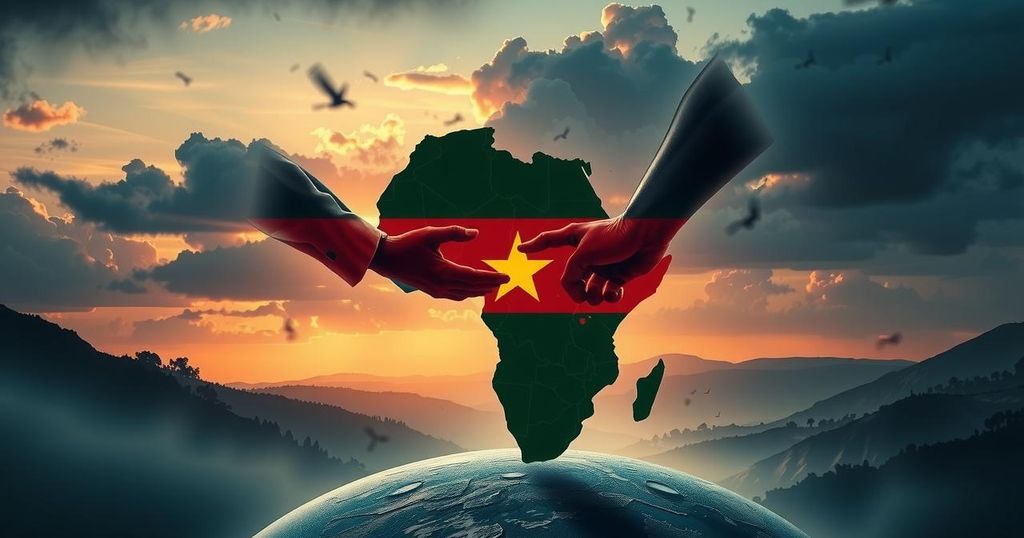The article explores the rivalry between Egypt and the UAE amid Sudan’s civil war, where Egypt backs the SAF and the UAE supports the RSF. With humanitarian crises unfolding and geopolitical tensions rising, the need for diplomatic intervention is urgent. Both nations’ contrasting strategies reflect deeper regional dynamics and highlight the necessity for a ceasefire and mediation to ensure stability in Sudan.
In the midst of Sudan’s devastating civil war, a significant yet overlooked power struggle is emerging between Egypt and the United Arab Emirates (UAE). Egypt aligns with the Sudanese Armed Forces (SAF), while the UAE supports the Rapid Support Forces (RSF), exacerbating a humanitarian crisis that began on April 15, 2023. The ongoing violence threatens to collapse Sudan altogether, prompting international interventions, including U.S. sanctions against both military leaders involved for their alleged war crimes.
Despite evidence linking the UAE to the RSF’s actions, the Emirati government maintains a facade of neutrality regarding humanitarian efforts in Sudan. This stance has been publicly challenged by high-ranking U.S. officials, including Secretary of State Marco Rubio, who accused the UAE of complicity in genocide. Meanwhile, Egypt’s involvement has become increasingly evident, as Foreign Minister Badr Abdelatty emphasized the SAF’s importance during his meetings with American officials, asserting Egypt’s commitment to bolstering Sudan’s army.
Post-2013, following the military coup in Egypt, President Abdel Fattah el-Sisi has relied on Gulf states for economic support, particularly from the UAE. Despite substantial investment in Egypt, the two nations diverge sharply on their Sudanese strategies. While the UAE seeks to leverage the RSF for economic gain in Sudan, Egypt considers the SAF pivotal for stability and regional influence, particularly in managing the ongoing refugee crisis and protecting its interests in the Nile Basin.
The deepening conflict in Sudan has jeopardized Egypt’s water security concerning the Nile River, as regional tensions heightened following the Grand Ethiopian Renaissance Dam situation. Egypt’s longstanding alliances have also been tested, as upstream Nile Basin countries capitalize on Sudan’s instability to advance their own agendas, including the recent enactment of the Cooperative Framework Agreement, which undermines Egypt and Sudan’s historical advantages.
As a response to the crisis, Egypt is strengthening its security alliances with countries like Somalia and Eritrea, positioning itself to support Sudan’s army against terrorism. Conversely, the UAE’s aspirations in Sudan hinge on extractive opportunities, particularly in the gold trade, but their plans have faltered as the RSF struggles to assert control amidst widespread violence.
The divergent strategies of Egypt and the UAE underscore a significant fracture in their visions for Sudan. Egypt, seeing the SAF as essential for Sudan’s national integrity, opposes any paramilitary involvement. Meanwhile, the UAE perceives the RSF as a tool for resource extraction, which has led to escalating geopolitical tensions and a stalled port development project critical for Emirati interests.
Efforts to reconcile differences have manifested through direct talks between the Sudanese government and the UAE, contingent upon the latter ceasing support for the RSF and compensating those affected by the conflict. This scenario poses challenges for the UAE, particularly concerning regional dynamics and its reputation in humanitarian circles.
Amid these complexities, Egypt is positioned to mediate effectively between Sudanese demands and Emirati intentions. An Egyptian diplomatic initiative appears to be gathering momentum, as Sudan’s foreign minister indicated ongoing discussions following recent high-level engagements with Egypt. A collaborative approach between the UAE and Egypt is critical for fostering a ceasefire and stabilizing Sudan in the long term, with potential for U.S. diplomatic support to facilitate this process, avoiding further descent into chaos.
The article addresses the power dynamics between Egypt and the UAE in the context of Sudan’s civil war, highlighting each nation’s support for opposing military factions and their strategic interests in Sudan. It examines the humanitarian crisis unraveling as a result of the conflict and emphasizes the importance of diplomatic engagement to achieve stability in the region. The historical ties and political developments are presented as foundational to understanding the current challenges facing both Sudan and its neighboring countries.
In conclusion, the escalating conflict in Sudan has catalyzed a power struggle between Egypt and the UAE, with each nation maintaining contrasting strategies aimed at securing their interests. The humanitarian fallout from this civil war underscores the urgency for diplomatic intervention, particularly through Egypt’s mediating capacity. A constructive dialogue between the UAE and Egypt, with potential U.S. support, is essential to prevent further descent into chaos in Sudan and to promote long-term stability in the region.
Original Source: responsiblestatecraft.org






